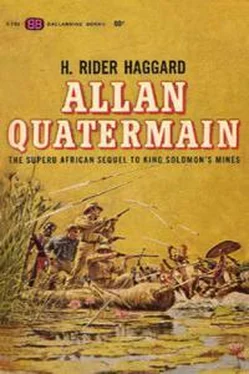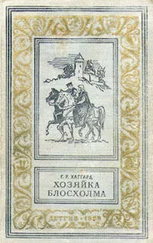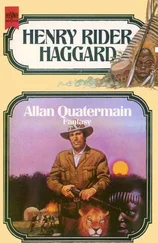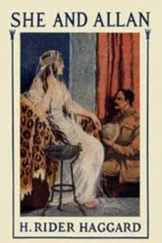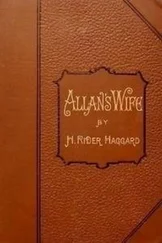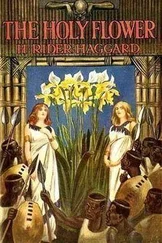Then I went on and got off to bed, and was washed and had my mail shirt removed. They hurt me a great deal in getting it off, and no wonder, for on my left breast and side was a black bruise the size of a saucer.
The next thing that I remember was the tramp of horsemen outside the palace wall, some ten hours later. I raised myself and asked what was the news, and they told me that a large body of cavalry sent by Curtis to assist the Queen had arrived from the scene of the battle, which they had left two hours after sundown. When they left, the wreck of Sorais' army was in full retreat upon M'Arstuna, followed by all our effective cavalry. Sir Henry was encamping the remains of his worn–out forces on the site (such is the fortune of war) that Sorais had occupied the night before, and proposed marching to M'Arstuna on the morrow. Having heard this, I felt that I could die with a light heart, and then everything became a blank.
When next I awoke the first thing I saw was the round disc of a sympathetic eyeglass, behind which was Good.
'How are you getting on, old chap?' said a voice from the neighbourhood of the eyeglass.
'What are you doing here?' I asked faintly. 'You ought to be at M'Arstuna—have you run away, or what?'
'M'Arstuna,' he replied cheerfully. 'Ah, M'Arstuna fell last week—you've been unconscious for a fortnight, you see—with all the honours of war, you know—trumpets blowing, flags flying, just as though they had had the best of it; but for all that, weren't they glad to go. Israel made for his tents, I can tell you—never saw such a sight in my life.'
'And Sorais?' I asked.
'Sorais—oh, Sorais is a prisoner; they gave her up, the scoundrels,' he added, with a change of tone—'sacrificed the Queen to save their skins, you see. She is being brought up here, and I don't know what will happen to her, poor soul!' and he sighed.
'Where is Curtis?' I asked.
'He is with Nyleptha. She rode out to meet us today, and there was a grand to–do, I can tell you. He is coming to see you tomorrow; the doctors (for there is a medical "faculty" in Zu–Vendis as elsewhere) thought that he had better not come today.'
I said nothing, but somehow I thought to myself that notwithstanding the doctors he might have given me a look; but there, when a man is newly married and has just gained a great victory, he is apt to listen to the advice of doctors, and quite right too.
Just then I heard a familiar voice informing me that 'Monsieur must now couch himself,' and looking up perceived Alphonse's enormous black mustachios curling away in the distance.
'So you are here?' I said.
'Mais oui, Monsieur; the war is now finished, my military instincts are satisfied, and I return to nurse Monsieur.'
I laughed, or rather tried to; but whatever may have been Alphonse's failings as a warrior (and I fear that he did not come up to the level of his heroic grandfather in this particular, showing thereby how true is the saying that it is a bad thing to be overshadowed by some great ancestral name), a better or kinder nurse never lived. Poor Alphonse! I hope he will always think of me as kindly as I think of him.
On the morrow I saw Curtis and Nyleptha with him, and he told me the whole history of what had happened since Umslopogaas and I galloped wildly away from the battle to save the life of the Queen. It seemed to me that he had managed the thing exceedingly well, and showed great ability as a general. Of course, however, our loss had been dreadfully heavy—indeed, I am afraid to say how many perished in the desperate battle I have described, but I know that the slaughter has appreciably affected the male population of the country. He was very pleased to see me, dear fellow that he is, and thanked me with tears in his eyes for the little that I had been able to do. I saw him, however, start violently when his eyes fell upon my face.
As for Nyleptha, she was positively radiant now that 'her dear lord' had come back with no other injury than an ugly scar on his forehead. I do not believe that she allowed all the fearful slaughter that had taken place to weigh ever so little in the balance against this one fact, or even to greatly diminish her joy; and I cannot blame her for it, seeing that it is the nature of loving woman to look at all things through the spectacles of her love, and little does she reck of the misery of the many if the happiness of the one be assured. That is human nature, which the Positivists tell us is just perfection; so no doubt it is all right.
'And what art thou going to do with Sorais?' I asked her.
Instantly her bright brow darkened to a frown.
'Sorais,' she said, with a little stamp of the foot; 'ah, but Sorais!'
Sir Henry hastened to turn the subject.
'You will soon be about and all right again now, old fellow,' he said.
I shook my head and laughed.
'Don't deceive yourselves,' I said. 'I may be about for a little, but I shall never be all right again. I am a dying man, Curtis. I may die slow, but die I must. Do you know I have been spitting blood all the morning? I tell you there is something working away into my lung; I can feel it. There, don't look distressed; I have had my day, and am ready to go. Give me the mirror, will you? I want to look at myself.'
He made some excuse, but I saw through it and insisted, and at last he handed me one of the discs of polished silver set in a wooden frame like a hand–screen, which serve as looking–glasses in Zu–Vendis. I looked and put it down.
'Ah,' I said quietly, 'I thought so; and you talk of my getting all right!' I did not like to let them see how shocked I really was at my own appearance. My grizzled stubby hair was turned snow–white, and my yellow face was shrunk like an aged woman's and had two deep purple rings painted beneath the eyes.
Here Nyleptha began to cry, and Sir Henry again turned the subject, telling me that the artists had taken a cast of the dead body of old Umslopogaas, and that a great statue in black marble was to be erected of him in the act of splitting the sacred stone, which was to be matched by another statue in white marble of myself and the horse Daylight as he appeared when, at the termination of that wild ride, he sank beneath me in the courtyard of the palace. I have since seen these statues, which at the time of writing this, six months after the battle, are nearly finished; and very beautiful they are, especially that of Umslopogaas, which is exactly like him. As for that of myself, it is good, but they have idealized my ugly face a little, which is perhaps as well, seeing that thousands of people will probably look at it in the centuries to come, and it is not pleasant to look at ugly things.
Then they told me that Umslopogaas' last wish had been carried out, and that, instead of being cremated, as I shall be, after the usual custom here, he had been tied up, Zulu fashion, with his knees beneath his chin, and, having been wrapped in a thin sheet of beaten gold, entombed in a hole hollowed out of the masonry of the semicircular space at the top of the stair he defended so splendidly, which faces, as far as we can judge, almost exactly towards Zululand. There he sits, and will sit for ever, for they embalmed him with spices, and put him in an air–tight stone coffer, keeping his grim watch beneath the spot he held alone against a multitude; and the people say that at night his ghost rises and stands shaking the phantom of Inkosi–kaas at phantom foes. Certainly they fear during the dark hours to pass the place where the hero is buried.
Oddly enough, too, a new legend or prophecy has arisen in the land in that unaccountable way in which such things to arise among barbarous and semi–civilized people, blowing, like the wind, no man knows whence. According to this saying, so long as the old Zulu sits there, looking down the stairway he defended when alive, so long will the New House of the Stairway, springing from the union of the Englishman and Nyleptha, endure and flourish; but when he is taken from thence, or when, ages after, his bones at last crumble into dust, the House will fall, and the Stairway shall fall, and the Nation of the Zu–Vendi shall cease to be a Nation.
Читать дальше
